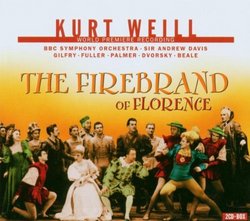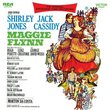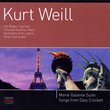| All Artists: Rodney Gilfry, Stephen Charlesworth, Stuart MacIntyre, Kurt Weill, Andrew Davis, Felicity Palmer, Lucy Schaufer, BBC Symphony Orchestra, Lori Ann Fuller, Robert Johnston Title: The Firebrand of Florence Members Wishing: 1 Total Copies: 0 Label: Original Cast Record Release Date: 3/23/2004 Genres: Pop, Soundtracks, Classical, Broadway & Vocalists Styles: Opera & Classical Vocal, Historical Periods, Modern, 20th, & 21st Century, Musicals Number of Discs: 2 SwapaCD Credits: 2 |
Search - Rodney Gilfry, Stephen Charlesworth, Stuart MacIntyre :: The Firebrand of Florence
 | Rodney Gilfry, Stephen Charlesworth, Stuart MacIntyre The Firebrand of Florence Genres: Pop, Soundtracks, Classical, Broadway & Vocalists
|
Larger Image |
CD DetailsSimilar CDs |
CD ReviewsFor fans only krebsman | New York, NY United States | 06/07/2008 (2 out of 5 stars) "Benvenuto Cellini was one of the Italian Renaissance/Baroque's most dashing figures, so it's hardly surprising that sooner or later he would end up on the stage. Berlioz created a symphonic work inspired by his autobiography and in 1924, Cellini's autobiography was greatly sanitized, expurgated and freely adapted by Edwin Justus Mayer into a hit Broadway sex farce, THE FIREBRAND, starring Frank Morgan (THE WIZARD OF OZ) as a rather bumbling, philandering version of The Duke of Florence and Joseph Schildkraut as Cellini. The play became a hit film in 1934 with Morgan receiving an Oscar nomination for recreating his Broadway role and Frederic March as Cellini. Given its distinguished pedigree, there were high hopes for THE FIREBRAND OF FLORENCE. Its esteemed creators (Moss Hart, Kurt Weill, Ira Gershwin) had just wowed Broadway with their breakthrough musical LADY IN THE DARK. But alas lightning did not strike twice. This seems to have been one of those ill-fated shows that was cursed from the outset. This was the wrong show for the wrong team. Kurt Weill's music does not really feel right for the late Renaissance/early Baroque setting. Ira Gershwin's sassy New York sensibility was completely at odds with it. To make matters worse, the wives of Hart and Weill (Kitty Carlisle and Lotte Lenya, respectively) were both determined to play the lead role and neither of them was right for it, in that the role called for an elegant, Italian beauty. The result was simply a mess. One song ("Sing Me Not a Ballad") is fairly well known among musical comedy aficionados, but the rest is virtually forgotten. It was never recorded. So on one level, one can be grateful to finally have the chance to hear a forgotten Kurt Weill/Ira Gershwin score. But this recording leaves much to be desired. The major problem is that it is a live concert performance in England. The acoustics go in and out and the British sensibilities are not a good match. It all comes off as a lot of purse-lipped chortling. The decision was also made to use opera singers rather than musical comedy performers. Opera singers are notoriously bad enunciators. Most of the lyrics are rendered incomprehensible. They are also notoriously bad actors and the men have speaking voices that sound like Dudley Doright. If one can get past these hurdles, the major problem is the material itself. Some lyrics may seem clever when heard once, but are excruciating when heard repeatedly. "Paris, oh Paris, your riches embarrass" is right up there with Maury Yeston's "Be Italian, you rapscallion." (That said, "A Rhyme for Angela" is vintage Gershwin and a delight to hear.) I hope someone will someday make another recording using American musical comedy performers and exclude all the dialogue. But until that unlikely event occurs, we're stuck with this one. This is only for die-hard Weill fans." Lesser Kurt Well William S. Oser | Florida, USA | 03/13/2009 (4 out of 5 stars) "Kurt Well was a major theater composer, his influence spreading over Cole Porter, Leonard Bernstein, down unto Stephen Sondheim. His major works are 3 Penny Opera, the opera Mahoganny, Johnny Johnson, One Touch of Venus, Lady in the Dark, Street Scene and Lost in the Stars. The Firebrand of Florence is not one of his greatest works. Some of what is said in the other review is true, the show did not come together, the story telling is problematic and the character of The Duchess was compromised by the desire of both Lotte Lenya and Kitty Carlisle Hart to play the part. Lotte Lenya won out, although Kitty Carlisle was probably more right for the part. With all that said, it is true the entire work does not come together well, but oh my there are some wonderful excerpts. I first heard several of these excerpts on Ben Bagley's Kurt Weill revisted, and I don't remember if it was volume I or II, but there is a whole medley of choral stuff and the two duets for Cellini and Angela sung by Jo Sullivan and John Reardon. Both of these were good musical comedy performers (he also sang some opera), but due to inappropriate orchestrations, the performances are not definative. John McGlinn then recorded serious excerpts from this piece with original orchestrations, Thomas Hampson taking the role of Cellini. He is in wonderful voice, but just a tad stiff, but McGlinn knows how to make this work. This recording, with narative to help understand the story telling lets us hear what Weill composed, how he thought it should go. Rodney Gilfrey, who does sing some lighter opera is absolutely wonderful, flexible, full of voice, full of swagger which the character must be. Lori Ann Fuller as Angela is acceptable, a little thin of voice for this part which was conceived as an operetta. In those days singers crossed between opera and operetta with ease. Maybe not the Wagnerian singers, but the Puccini and some Verdi singers certainly did. Dorothy Kirsten was beloved at the Met in Puccini and some french roles, and she had a whole other career in pop songs and operetta. The operettas were concieved for opera weight voices. George Dvorsky is a perfect solid musical comedy baritone for the Duke and brings some Alfred Drakeish sly humor to the part. Felicty Palmer is probably perfectly cast in the part of the Duchess, but the writing of the part, discussed above sabotages her. The conducting is fine, the orchestra plays well. This is a superb recording of a work that is a great deal less than perfect. Maybe its not for everybody, but it is right for Kurt Weill afficianados, operetta buffs and lots of others. Too bad that it is not hard to get and so very expensive. It deserves to be widely available." Pure Delight! M. Cleveland | Albuquerque, NM USA | 09/07/2009 (4 out of 5 stars) "Whew! Some reviewers need to grow a sense of humor. "Kurt Weill's music does not really feel right for the late Renaissance/early Baroque setting" indeed! Good grief! This is a delightful score and story, fabulously well performed AND recorded. All the wit and zing of "Connecticut Yankee in King Arthur's Court." Which means, it ain't "Street Scenes" or "Mahagony," and that's perhaps why some folks can't get into this: it's not what they expect. If you can find this at the $30-40 is really should cost (2 disks), pick it up and enjoy!"
|

 Track Listings (16) - Disc #1
Track Listings (16) - Disc #1

